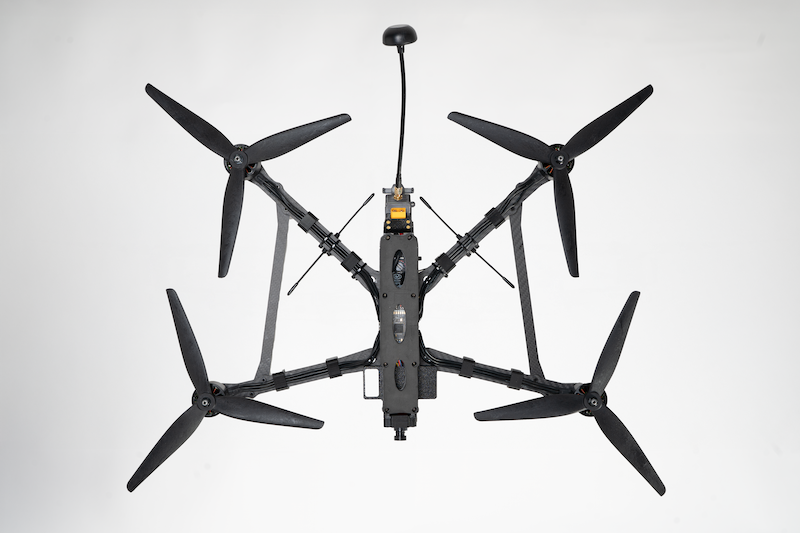Ukrainian Defence Tech Startup The Fourth Law Raises Funding, Launches AI-Powered FPV Drone System
For the first time, the company is showcasing a video of the widespread battlefield deployment of AI-guided targeting and products – TFL-1 autonomy module and the Lupynis-10-TFL-1 UAV, designed to empower every single drone with a crucial, primary level of autonomy.
The Fourth Law (TFL / Четвертий Закон), a defence tech company headquartered in Kyiv, Ukraine announced that it raised funding from a group of venture funds and angel investors based in the EU, USA, and Canada.
The company’s first products, the TFL-1 autonomy module, and the Lupynis-10-TFL-1 UAS (daytime or nighttime) — increase the success of FPV drone missions by a factor of 2-5 times, whilst increasing their cost by just 10-20%. This becomes possible by transferring the control over the drone in its last 500 metres of flight to an onboard computer running AI algorithms.
The Ukrainian Defence Forces use the products in volumes, as it helps them solve the issues related to electronic warfare, radio horizon limitations, whilst enhancing their pilots’ precision capability.
Following several years of R&D and rigorous testing with the Armed Forces of Ukraine, TFL successfully pioneered a unique, multi-level artificial intelligence system. It is engineered to precisely identify and categorise targets, whether stationary or moving, ensuring high-precision strikes.
The company’s Founder and CEO, Yaroslav Azhnyuk, a serial tech entrepreneur who previously founded globally renowned pet camera company Petcube, said:
Massively scalable drone autonomy is the single most important defence technology of this decade. There’s no one on the planet who understands this better than the Ukrainian Defence Forces.
We’re doing the most important work of our lives, and the funding we’ve raised from the investors is an invaluable catalyst to the growing defensive capabilities of the Free World.
We will need, however, much more resources to deliver on the full potential of this technology. We must make sure that the adversaries of democracy and freedom won’t get there faster.
In addition to The Fourth Law, Azhnyuk co-founded Odd Systems, a defence technology company specialising in thermal cameras and FPV drone manufacturing. He also founded Fuel Finance and O0 Design earlier in his career. The company’s name is a reference to Isaac Asimov’s Three Laws of Robotics, with a hint at the discovery of an enigmatic Fourth Law.
Azhnyuk, who shifted from consumer technology to defence tech following the 2022 Russian invasion of Ukraine, brings over a decade of experience scaling hardware companies globally. His previous venture, Petcube, shipped over 1 million devices worldwide, operating across Ukraine, the US, and China.
Colonel Ruslan Shevchuk, Commander of the 58th Motorised Infantry Brigade of the Armed Forces of Ukraine, noted:
Since March 2025, pilots of the 58th Separate Motorised Infantry Brigade have been utilising aircraft equipped with the TFL-1 system, which has demonstrated its effectiveness on the battlefield during this period.
It helps us overcome electronic warfare, jamming, acquire, and strike targets in challenging conditions. Its capabilities are most notably demonstrated during special missions. Our operational experience confirms it as a truly effective system.
Since its founding in 2023, The Fourth Law has released TFL-1, a massively manufacturable and low-cost module providing any FPV drone with state-of-the-art terminal guidance and cruise capabilities. Engineered for mass deployment, the TFL-1 is designed to achieve production volumes of hundreds of thousands of units monthly.
Its cost-effectiveness ensures that this vital technology can be integrated into every FPV drone, enabling rapid scaling and over-the-air updates. In addition, the company ships Lupynis-10-TFL-1: both as an unmanned aerial vehicle (UAV), i.e., a singular drone, and an unmanned aerial system (UAS) consisting of a hundred 10-inch FPV drones with TFL-1 autonomy, a ground control station, and support equipment.
These drones are capable of reaching targets within 30 kilometres with a payload of 1 kg, and a maximum payload of 3.5 kg at shorter distances. Aside from the Lupynis platform, TFL-1 is integrated in over a dozen major FPV manufacturers’ drones. The company offers Lupynis-10-TFL-1 UAS to the Government and Defence Forces whilst the TFL-1 module, through licensing, is available to other FPV manufacturers. Codified and certified, TFL products are in use by the Government of Ukraine and numerous units in the Ukrainian Defence Forces.
The Fourth Law is an autonomous robotics company built on a thesis that by 2030, autonomous robots will be disrupting trillion-dollar industries, including in defence, transportation, agriculture, and construction. Founded in Kyiv in 2023 by Yaroslav Azhnyuk, who holds a Master’s degree in Computer Science from Kyiv Polytechnic University, the company envisions a future where autonomous robots create strong military deterrence whilst taking over jobs that humans don’t find particularly interesting or safe. TFL’s vision for full and massively scalable autonomy for defensive FPV drones assumes five stages of autonomy:
- Terminal guidance
- Terminal guidance for bombing
- Target detection and engagement
- GPS-denied navigation
- Autonomous take-off and landing
Once that is achieved, second-order products become possible and viable for the modern military requirements, including drone swarms and nests, drone carriers, and fully autonomous interceptors of drones of different types.
The software stack enabling autonomy, which starts with tooling such as simulation and analytical software and ends with autonomous applications and fleet management systems is relatively easy to transfer between the platforms – from quadcopters to fixed-wing UAVs, missiles, ground and sea drones. This functionality is fully independent of satellite navigation system (GNSS) access. The experience is further transferable to the civil use domains outside of defence, including but not limited to logistics, manufacturing, and construction.
The recent funding and increased adoption rate establish The Fourth Law as one of the leaders in the growing space of massively scalable robotic autonomy, with a particular application in the defence space.


0 comments